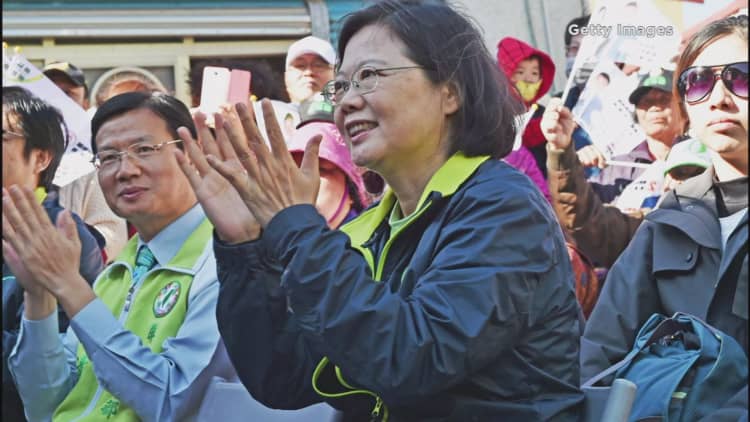
China is piling the pressure on Taiwan's President-elect Tsai Ing-wen to acknowledge the "One-China" policy just days before she officially takes over.
The high profile moves started early this year after Tsai, who represents the pro-independence Democratic Progressive Party (DPP), was elected. She'll officially take over on May 20.
Earlier this month, China's Taiwan Affairs Office spokesman Ma Xiaoguang stressed at a news briefing that the two sides have to operate on the principle of the policy.
"We must repeat, if there is deadlock or a crisis across the Taiwan Strait, the responsibility will be on those who change the status quo," said Ma in a transcript on the office's website.
With DPP traditionally favoring independence from its estranged mainland sibling, the sticking point in cross-straits relations now is that Tsai has yet to acknowledge or accept the "One-China" policy under the framework known as the "1992 Consensus"—a tacit understanding reached that year at a meeting between semi-official representatives that acknowledges that there is only one China, although the mainland and Taiwan can have their own interpretation of what that stands for.
China and Taiwan parted ways in 1949, when the Nationalist Party (KMT) was forced to retreat to Taiwan by the Chinese Communist Party. No armistice or peace treaty has ever been signed and China views the territory as a renegade province that can be re-taken by force if necessary.
Although there have been rocky patches over the decades with fears of military conflicts occurring across the strait, relations between the two have warmed since 2008 years under current KMT president Ma Ying-jeou's administration which recognizes the 1992 Consensus.
In a show of apparent goodwill, Chinese president Xi Jinping and Ma met in Singapore in a historic meeting between the two sides in November last year.
With Ma's KMT out of the picture however, China is making its stance over Taiwan's sovereignty clear in an effort to press Tsai on her stand on the issue.
On Monday, China state-run news agency Xinhua reported a phone call between Chinese foreign minister Wang Yi and U.S. Secretary of State John Kerry during which Wang urged the U.S. to "abide by the one-China policy" and "properly handle the Taiwan issue."
In the weeks leading up Tsai's inauguration, China repatriated Taiwanese individuals suspected of perpetrating cyber crimes from Kenya and Malaysia. Their argument: most victims of the cyber crimes are on the mainland.
Taiwanese criminals "have been falsely presenting themselves as law enforcement officers to extort money from people on the Chinese mainland through telephone calls", China's Ministry of Public Security said in April when suspects were deported from Kenya to China.
In March, China's military commemorated a key victory over Taiwan's Nationalist forces in 1949.
In the same month, the Chinese government warned Taiwan not to pass new laws governing relations with China.
"They are telling Taiwan that they need to play the game by Beijing's playbook and are using every tacit they have," said Katherine Tseng, a researcher at the National University of Singapore who specializes in international law and cross straits relations.
The posturing by Beijing comes amid a rise of nationalism in China as the country undergoes major changes in its economy could threaten social stability.
"To the nationalists, Taiwan is part of Chinese territory, it is the last bastion of resistance against imperialism and that refers to America. They are pushing Beijing: 'this is what you told us in the textbooks, you can't let it go'," said Tseng.
U.S. does not have official diplomatic ties with Taiwan but the two have historically shared a close relationship.
Mark Harrison, a Taiwan specialist at the University of Tasmania in Australia, however warned to read too much into the maneuvers.
"The key pressure point that China is likely to continue applying to Tsai is for her to acknowledge the 1992 Consensus," he said.
Just as China is trying to negotiate the new political landscape in Taiwan, the island is also talking up recent brushes with China "to give it a bit of breathing space and present itself as more reasonable and accommodative for some equilibrium in the relationship," Harrison added.
Tsai herself is also trying to negotiate between the hardline pro-independence factions in the DPP and the Communist Party of China while trying to focus on the pressing task of restructuring the Taiwanese economy which entered into recession in December.
Both experts said Tsai—who has long said she will maintain the status quo of the amorphous relationship with China—will likely continue to take a passive stance on Taiwan's relationship with China in the short-term as she focuses on local issues. Beyond the rhetoric, the mainland is also likely to stand pat for now.
"It is too early to see whether there will be a change in China's policies towards Taiwan. China must have foreseen DPP coming into power and yet they didn't change their policies in preparation, so there is no sign that they have a new policy position that they are ready to implement," said Harrison.





